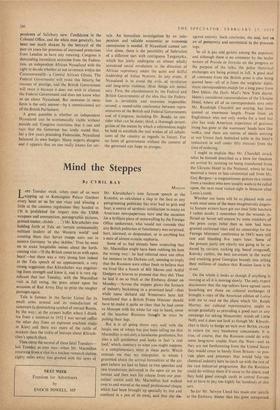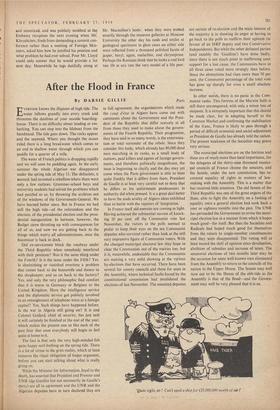Mind the Steppes
By 'CYRIL RAY LAST Tuesday week, when most of us were nipping up to Kensington Palace Gardens every hour or so for our visas and wincing a little at the customs regulations they handed us ('lt is prohibited for import into the USSR weapons and ammunition, pornographic pictures, printed matter, clichés . . .') Mr. Khrushchev was holding forth at Tula on 'certain unreasonably militant leaders of the Western world' and assuring them that Soviet' troops were not in eastern Germany 'to play skittles.' True he went on to make hospitable noises about the forth- coming visit-1f the British come to us with open heart'—but there was a very strong hint indeed in the Tula speech of no appeasement, a very strong suggestion that Khrushchev was negotiat- ing from strength and knew it, and it is very sig- nificant that last Tuesday, with the Macmillan visit in full swing, the press seized upon the occasion of Red Army Day to print the tougher passages again.
Tula is famous in the Soviet Union for its small arms arsenal and its manufacture of samovars (a diminishing symbol of eternal Russia, by the way : at the airport buffet where I drank tea from a samovar in 1952 I was served coffee the other day from an espresso machine made in Kiev) and there was more of the rattle of muskets than the tinkle of teacups about Khrush- chev's speech there.
Then came the second of these fatal Tuesdays— last Tuesday as ever was—when Mr. Macmillan returning from a visit to a nuclear research station eighty miles away was greeted with the news of Moscow Mr. Khrushchev's now famous speech at the Kremlin, as calculated a slap in the face as any peregrinating politician has ever had to grin and bear, a source of sardonic satisfaction to many an American newspaperman here and the occasion for a brilliant piece of stonewalling by the Foreign Office spokesman, who would not concede that any British politician or functionary was surprised, hurt, alarmed, or despondent, or in anything but a state of almost ecstatic euphoria.
Some of us had already been suspecting that Mr. Macmillan might have been rubbing his host the wrong way he had referred once too often for instance to the Dickens cult, seeming to imply that the Russians were either fools to believe that we lived like a bunch of Bill Sikeses and Artful Dodgers or knaves to pretend that they did. Then he laid it on so thick at the Embassy dinner on Monday—'Across the steppes glows the furnace of industry beckoning to a promised land'—that while some diehard old Westerners here felt humiliated that a British Prime Minister should have to make it quite so clear that he had come to Moscow with his white fur cap in hand, some of the touchier Russians thought he must be pulling their legs.
But it is all going down very well with the locals, one of whom has just been telling me that "Macmillan is not only a.handsome gentleman, but also a tall gentleman and looks in fact 'a real lord,' which, contrary to what you might suppose, is a complimentary term in these parts. Which reminds me that my interpreter, to whom 1 grumbled about the arrival formalities at the air- port (where we had to listen to two speeches and two translations delivered in the open air on the tarmac and then wait for release from our jour- nalists' corral until Mr. Macmillan had walked over to and waved at the small professional claque which had been brought' up specially by bus and confined in a pen of its own), said that she dis- agreed entirely; Such courtesies, she said, lent an air of pomposity and ceremonial to the proceed- ings.
So all is gas and gaiters among the populace, and although there is no comment by the leader writers of Pravda or lzveslia on the progress or the purpose of the talks, the polite rhetorical exchanges are being printed in full. A good deal of comment from the British press is also being quoted here—all of it from the weightier diplo- matic correspondents except for a long piece from Don lddon, the Daily Mail's New York diarist. Iddon's considered commendation of the Ukraine Hotel, where all of us correspondents save only Mr. Randolph Churchill are staying, has been quoted at enormous length. Praise from an Englishman who not only works for a lord but also has wide American experience of gracious living has gone to the waitresses' heads here like vodka, and there are stories of meals arriving at our Union Jack bedecked table in the hotel's restaurant in well under fifty minutes from the time of ordering.
I ought to explain that Mr. Churchill struck what he himself described as a blow for freedom on arrival by insisting on being transferred from the Ukraine Hotel 'to the National, where he has received a more or less ceremonial call from Mr. Guy Burgess—a magnanimous gesture to a visitor from a resident who now usually waits to be called upon, the next most visited sight in Moscow after Lenin's tomb.
Whether our hosts will be as pleased with our work once some of the more imaginatively jingois- tic feature writers have got out their little hatchets 1 rather doubt. I remember that the wounds in- flicted on Soviet self-esteem by some members of the press corps (who' then as now had been granted unlimited visas and no censorship for the Foreign Ministers' conference in 1947) were still raw and bleeding five years later. Some of the present party are clearly not going to be se- duced by caviare, sucking pig, boeuf stroganoff, Kievsky cutlets, the best ice-cream in the world and cracking good Georgian brandy into telling their millions of readers that Russian food is fit to eat.
' On the whole it looks as though if anything is moving at all it is moving slowly. The only expert discussions that the top talkers have agreed upon launching are those on cultural exchanges (I brought a copy of the American edition of Lolila with me to read on the plane which Mr. Ralph Murray, our cultural representative, ought to accept gratefully as providing a good start in any campaign for taking Muscovites' minds off Little Nell), and it does not look as though Mr. Khrush- chev is likely to budge an inch over Berlin, except in return for very. handsome concessions. It is true, of course, that the Russians could do with some long-term credits from the West—and as they are not forthcoming from the United States they would come in handy from Britain—to pro- vide plant and processes that would help the chemical industry here to catch up with the rest of the vast industrial programme. But the Russians could do without them if it came to the pinch, and they hold good enough cards in central Europe not to have to pay too highly for handouts of this sort.
So far Mr. Selwyn Lloyd has made one speech at the Embassy dinner that has gone unreported
and unnoticed, and was publicly snubbed at the Embassy reception the next evening when Mr. Khrushchev, fresh from demanding a summit con- ference rather than a meeting of Foreign Min- isters, asked him how he justified his position and what problem he had ever solved. Poor Mr. Lloyd could only answer that he would provide a list next day. Meanwhile he tags dutifully along at Mr. Macmillan's heels: when they were trotted smartly through the museum galleries at Moscow University the other day his nods and smiles at geological specimens in glass cases on either side were reflected from a thousand polished facets of jasper, beryl, agate, malachite, and chrysoprase. Perhaps the Russians think that he looks a real lord too. Or at any rate the very model of a life peer.



































 Previous page
Previous page